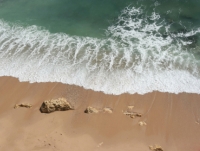 |
Closing the Science Gaps on What is Happening to the World's Oceans and Seas
 |
UN Experts' Report to Governments Charts Ways Forward
The world's oceans and seas-covering 70 per cent of the planet - may soon be
subject to the same kind of systematic scientific scrutiny as the globe's land
surface.
Governments are meeting today to consider a series of options and
recommendations on establishing just such a monitoring process. It is aimed at
plugging significant and serious knowledge gaps that are undermining humanity's
ability to better manage a wealth of natural and nature-based marine resources.
If governments give the process the green light, the first globally integrated
oceans assessment could be delivered under the auspices of the United Nations by
2014.
Achim Steiner, UN Under-Secretary General and UNEP Executive Director, said: "The
marine environment is facing a multiplicity of challenges. Some, such as the
decline in fish stocks and land-based sources of pollution are persistent ones.
Others, from the emergence of 'dead zones' and the impacts of climate change
including acidification are rapidly emerging ones. A systematic assessment
process is long overdue. This meeting in New York represents a tremendous
opportunity for governments to put the best marine science at their service in
order to make the best management choices over the coming years and decades."
"Significantly, a very real concern has been acknowledged today with the launch
of the Assessment of Assessments report - the first ever comprehensive overview
of the marine assessment landscape - which also considers socio-economic factors.
The report is a clear signal that the world needs a more inclusive approach on
its oceans and resources. It provides a framework and options for how this can
be done," said Mr. Koïchiro Matsuura, Director-General of the United Nations
Educational, Scientific and Cultural Organization.
Despite the central role oceans play in the economic, environmental and social
affairs of the planet's 6.7 billion inhabitants, significant gaps exist in our
understanding and management of the complex processes at work - from the global
climate system, to the water cycle and circulation of nutrients, to changes
affecting marine habitats.
In addition, the vastness of the world's oceans have for far too long been
perceived as impervious and indestructible to human impact.
The clearing of mangroves and coastal wetlands, the over-exploitation of fish
stocks, rising tides of pollution, among many other challenges, are affecting
the marine environment's ability to sustain livelihoods and life itself.
Meanwhile, climbing concentrations of greenhouse gases - equal to a third or
more of annual carbon dioxide emissions - are being absorbed, as well as untold
amounts of heavy metals, triggering mounting concern over the marine food chain.
To deal with this situation, improved monitoring and observation practices,
regular assessments to provide a deeper understanding of the status and trends
of environmental changes, and the know-how and ability to prevent, mitigate and
adapt to these changes are urgently required.
That is why governments - at the 2002 World Summit on Sustainable Development (WSSD)
and, subsequently, the UN General Assembly in 2005 - recommended that a regular
UN process for the global reporting and assessment of the state of the marine
environment, including its socio-economic aspects, be initiated. The UN
Environment Programme (UNEP) and the Intergovernmental Oceanographic Commission
of UNESCO (IOC-UNESCO) were asked to serve as the lead agencies in this work.
The initial phase of the process came to be known as the "Assessment of
Assessments". Under it, an Expert Group set up in 2006 examined various existing
marine assessments, evaluating factors central to the influence of assessments,
such as scientific credibility, policy relevance and legitimacy, which also
helped identify best practices; thematic, geographic or data gaps, scientific
uncertainties, as well as research and capacity-building needs, particularly in
the developing world.
The Group will today present their findings to a special Working Group of the UN
General Assembly, which will have before it a set of options and recommendations
for governments to consider, on ways to move the envisioned "Regular Process"
forward. These include clear formulations of the overall objective, the products
to be delivered in the first five years of the process, its functionality and
funding.
If established, the Regular Process for the reporting and assessment of the
state of the marine environment will "serve as the mechanism to keep the world's
oceans and seas under continuing review by providing regular assessments at
global and supra-regional levels."
The Working Group will also have before it a set of organizational options.
These deal with the relationship of the "Regular Process" to the UN at the
intergovernmental level; and the establishment of a management oversight body, a
new expert group, and secretariat support mechanisms. The report provides a set
of financing options which could average between $4 million and $5.6 million a
year.
The GA Working Group was established to recommend a course of action on the
Regular Process to the General Assembly at its sixty-fourth session in late
2009.
Publicado por Web
UNEP (31/08/09).